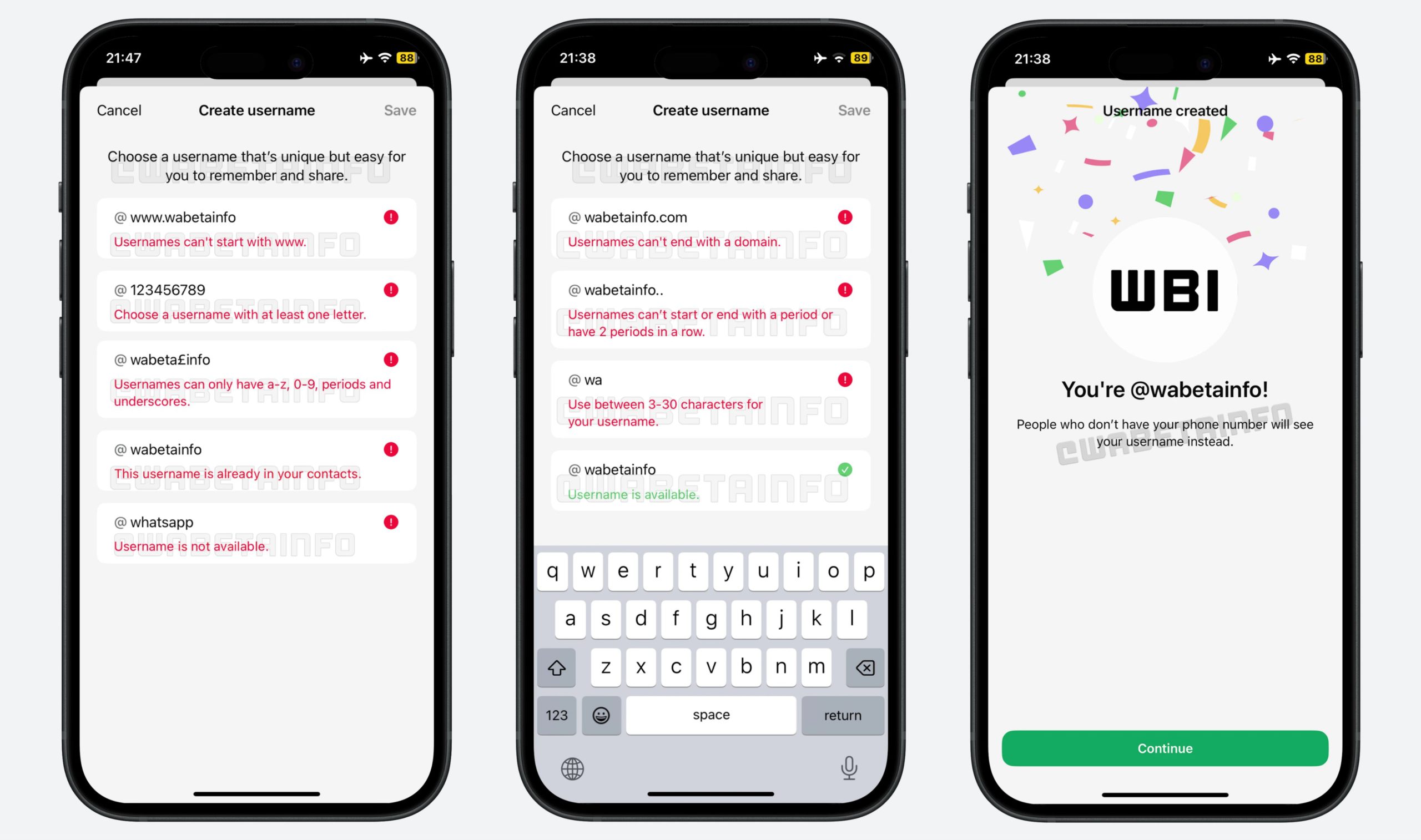Is it true we shall see WhatsApp Usernames?
WhatsApp is finally preparing to roll out usernames. Long demanded and widely speculated, the feature—currently under development—will allow users to communicate without having to share their phone numbers. It’s a monumental step toward bolstering privacy, and it puts WhatsApp in line with competitors like Telegram and Signal, both of which already allow connections via usernames.
Discovered in a recent iOS beta release, the username system isn’t publicly available just yet, but the evidence is clear: the gears are in motion. Beta code has revealed backend structures, interface elements, and validation protocols. While WhatsApp hasn’t made a formal announcement or confirmed a rollout date, the presence of these features in live beta code suggests that public testing could be just around the corner.
A New Identity Layer for WhatsApp
Until now, WhatsApp has relied almost entirely on phone numbers as the sole means of identity and connection. While this model has proven effective for personal contacts, it has also limited how the app can be used—especially in group chats, business interactions, or conversations with strangers where privacy matters.
Usernames offer a new identity layer that allows users to engage without revealing their phone numbers. When someone initiates a chat with you, they’ll see your username instead of your number—assuming they don’t already have your contact saved. This simple change has major implications. It creates a way to manage conversations with more anonymity, more security, and more comfort.


The username feature is particularly timely in a world where messaging platforms double as commerce hubs, social networks, and customer support tools. Whether you’re buying something from a marketplace, chatting in a hobby group, or seeking support from a business, usernames allow you to maintain a layer of privacy that’s long overdue.
How the Username System Works
WhatsApp is designing its username feature with rules that balance flexibility and clarity. Here’s what we know so far:
- Usernames must include at least one letter — usernames made of just numbers or symbols won’t be accepted.
- They cannot start with “www.” — likely to avoid confusion with web addresses or phishing attempts.
- Accepted characters include lowercase letters (a–z), numbers (0–9), periods, and underscores.
- They must be between 3 and 30 characters long.
- No usernames with multiple consecutive periods or those ending in a period will be allowed.
Once you create and confirm a valid username, WhatsApp will celebrate with a cheerful confetti animation—adding a light-hearted moment to a major new feature. After that, your username will begin to show up in conversations, including group chats and one-on-one messages.
The system is also dynamic. If you change your username later, WhatsApp will generate a system message in ongoing chats to inform other participants, similar to how it currently announces changes to your display picture or phone number.
A Second Layer: Username PINs
In another sign of WhatsApp’s evolving security focus, the platform is working on an optional PIN system tied to usernames. The idea is simple but powerful: when enabled, your username won’t be enough to start a chat with you—someone will also need to know your four-digit PIN.
This effectively acts as a second gate, giving users greater control over who can initiate conversations. It’s a tool designed to combat spam and unsolicited messages, especially as usernames introduce more open-ended contact options. WhatsApp is expected to prompt users to set up a PIN when they create a username, but the feature will remain optional.
This innovation mirrors WhatsApp’s continued push for stronger privacy norms, aligning with other recent enhancements like disappearing messages, locked chats, and encrypted backups.
Username Availability Checks and Web Support
To make the process of choosing a username smoother, WhatsApp is building a tool to let users check the availability of a handle before confirming it. This username availability checker is expected to roll out across platforms, including WhatsApp Web, allowing users to preview and test different combinations before settling on one.
This feature also helps reduce frustration and minimizes the trial-and-error process of selecting a name that isn’t already taken. It’s one of several small, thoughtful details that suggest WhatsApp is taking this rollout seriously, aiming for a smooth user experience from day one.
When Will WhatsApp Launch WhatsApp Usernames? Are they available yet?
As of now, there is no confirmed launch date. However, the appearance of these features in the beta version of WhatsApp for iOS—particularly version 25.17.10.70—indicates that testing is well underway. Backend structures are in place, user interface strings are ready, and the rules for usernames are coded into the app. That typically means a public beta release, or even a gradual general release, could be imminent.
This development also comes as WhatsApp has been aggressively expanding its product offerings, including the launch of a native iPad app, enhanced group tools, and improvements to WhatsApp Business. With usernames now in the spotlight, it’s clear the platform is moving toward a more privacy-aware, user-centric future.
What This Means for You
For the everyday user, WhatsApp usernames mean more control. You’ll soon be able to talk to people without giving them your number. You can join a new group, buy something through a local marketplace, or message a new contact without exposing your identity.
For creators, freelancers, and small businesses, usernames might serve as digital calling cards—public handles that allow people to reach you without needing your phone number. And with the optional PIN system, you can still tightly control who gets through.
This move also places WhatsApp in closer competition with Telegram, which has long embraced usernames and public profiles. But unlike Telegram’s more open architecture, WhatsApp’s implementation appears rooted in cautious privacy, balancing access with control.
Final Thoughts
The arrival of usernames on WhatsApp isn’t just a feature update—it’s a shift in how we use and think about the platform. It gives users agency over their identities in ways that weren’t possible before and signals WhatsApp’s commitment to evolving in a privacy-conscious direction.
As we await the official rollout, one thing is clear: the WhatsApp you know is about to get a whole lot more private—and a little more personal. Whether you’re ready to grab your perfect handle or just want to keep your number out of reach, usernames are a welcome addition in an era that demands smarter, safer digital communication.
First published: June 3, 2025 – 08:20 AM




